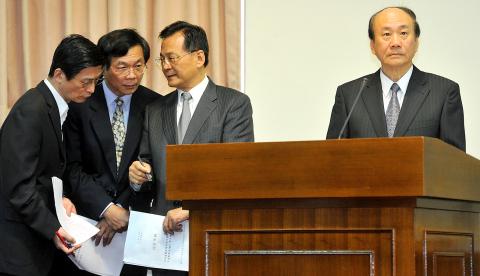Taiwan Power Co’s (Taipower) application to the Atomic Energy Council to extend the lifespan of the Jinshan Nuclear Power Plant shows that President Ma Ying-jeou’s (馬英九) promise not to extend the life of the three operating nuclear power plants is just another broken promise, a lawmaker and antinuclear activists said yesterday.
The criticism came as Minister of Economic Affairs Chang Chia-juch (張家祝) and a section head from the council’s Nuclear Regulation Department, Chang Shin (張欣), appeared before the legislature’s Economics Committee yesterday.
Chang Shin told lawmakers that Taipower has approached the council about its application to extend the life of the Jinshan Nuclear Power Plant in New Taipei City’s Shihmen District (石門) and was asked to submit additional data.

Photo: Liu Hsin-de, Taipei Times
Asked if such a review went against Ma’s promise not to extend the lifespan of the three operating plants, Chang Shin said: “Energy policies are made by energy-related agencies, and the Atomic Energy Council is in charge of monitoring nuclear safety. Taipower postponed its operation extension application [made in 2009] on its own, so it has the right to resume it.”
During a press conference on energy policy on Nov. 3, 2011, Ma said that Taiwan would steadily move toward the goal of reducing nuclear power and would not extend the lifespan of the three operating nuclear plants.
Democratic Progressive Party Legislator Cheng Li-chun (鄭麗君) said that as the Jinshan plant’s spent fuel pool is almost at full capacity, extending its lifespan would be neglecting the life and property of the more than 7 million people who live in the Greater Taipei area.
Cheng said the Executive Yuan has previously claimed that several countries have found final repositories for their high-level radioactive wastes, including spent nuclear fuel, but very few countries have finalized their decisions.
Even if they have finalized their decisions, it would be impossible for them to accept Taiwan’s spent nuclear fuel, she said.
Only Sweden and Finland are still planning to establish nuclear waste final repositories, but Finland’s laws stipulate that “nuclear wastes that are not domestically produced shall not be handled, stored or permanently disposed of in Finland,” she said.
There is not a township in Taiwan that is willing to accept nuclear waste and the government is lying to the public with its claims of “international cooperation” and “treatment across national boundaries,” she said.
Taipower chief nuclear energy engineer Chai Fu-feng (蔡富豐) said that although Finland’s final repository for high-level radioactive wastes in Olkiluoto Island, Eurajoki cannot accept Taiwan’s raw spent nuclear fuel, there are still many possibilities for Taiwan’s high-level radioactive waste treatment after processing in the future.
The International Atomic Energy Agency encourages international cooperation in dealing with nuclear waste, although no specific plan has been reached, he said.
Meanwhile, Green Citizen Action Alliance deputy secretary-general Hung Shen-han (洪申翰) said trying to extend the lifespan of the three plants “is the Ma government’s expression of pro-nuclear power and a completely regressive step.”
Wang Chung-ming (王鐘銘), of the Northern Coast Anti-Nuclear Action Alliance, said the government is trying to use the extension of the three plants’ to hide that it lacks the ability to decommission the plants or deal with nuclear waste.

The manufacture of the remaining 28 M1A2T Abrams tanks Taiwan purchased from the US has recently been completed, and they are expected to be delivered within the next one to two months, a source said yesterday. The Ministry of National Defense is arranging cargo ships to transport the tanks to Taiwan as soon as possible, said the source, who is familiar with the matter. The estimated arrival time ranges from late this month to early next month, the source said. The 28 Abrams tanks make up the third and final batch of a total of 108 tanks, valued at about NT$40.5 billion

Two Taiwanese prosecutors were questioned by Chinese security personnel at their hotel during a trip to China’s Henan Province this month, the Mainland Affairs Council (MAC) said yesterday. The officers had personal information on the prosecutors, including “when they were assigned to their posts, their work locations and job titles,” MAC Deputy Minister and spokesman Liang Wen-chieh (梁文傑) said. On top of asking about their agencies and positions, the officers also questioned the prosecutors about the Cross-Strait Joint Crime-Fighting and Judicial Mutual Assistance Agreement, a pact that serves as the framework for Taiwan-China cooperation on combating crime and providing judicial assistance, Liang

A group from the Taiwanese Designers in Australia association yesterday represented Taiwan at the Midsumma Pride March in Melbourne. The march, held in the St. Kilda suburb, is the city’s largest LGBTQIA+ parade and the flagship event of the annual Midsumma Festival. It attracted more than 45,000 spectators who supported the 400 groups and 10,000 marchers that participated this year, the association said. Taiwanese Designers said they organized a team to march for Taiwan this year, joining politicians, government agencies, professionals and community organizations in showing support for LGBTQIA+ people and diverse communities. As the first country in Asia to legalize same-sex

MOTIVES QUESTIONED The PLA considers Xi’s policies toward Taiwan to be driven by personal considerations rather than military assessment, the Epoch Times reports Chinese President Xi Jinping’s (習近平) latest purge of the Chinese People’s Liberation Army (PLA) leadership might have been prompted by the military’s opposition to plans of invading Taiwan, the Epoch Times said. The Chinese military opposes waging war against Taiwan by a large consensus, putting it at odds with Xi’s vision, the Falun Gong-affiliated daily said in a report on Thursday, citing anonymous sources with insight into the PLA’s inner workings. The opposition is not the opinion of a few generals, but a widely shared view among the PLA cadre, the Epoch Times cited them as saying. “Chinese forces know full well that